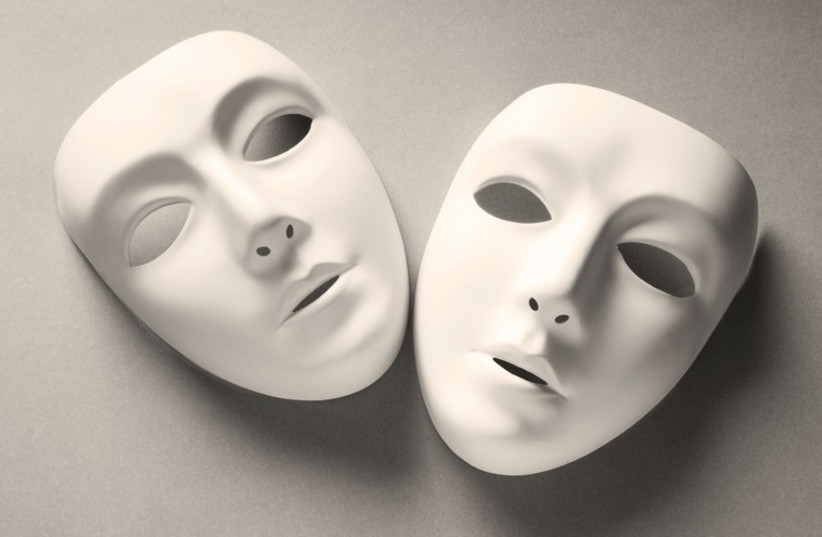‘POV’ by Henry Andrawes,
Haifa University Theater
March 17
A lanky Egyptian theater scholar (Ahmad Nizam Ayoub) claimed the witches in Shakespeare’s Macbeth are the inner reality of a returning war hero. A British researcher (Reema Assaf) objected. Isn’t he ignoring centuries of female witchcraft? This is how POV (Points of View), an Arabic adaptation of Macbeth written by Henry Andrawes and Haifa University theater students, began.
“If Macbeth met three wizards, you’d believe they were real,” she added.
As more participants weighed in, the scene changed. The female professors crawled and hailed their male colleague. “Salam Ya Makbith, Ya Raais al Glamis” (All hail, Macbeth! hail to thee, thane of Glamis!) they hissed. “Wait!” Shouted their Israeli host (Majd Abu Ghosh) “what is dababiyys (foggy, murky)?”
“It is as if you were hiding from bombs in a shelter,” explained a Syrian academic who fled from Assad’s war to Germany (Lana Daw), “you just emerged, there is a cloud of dust and everyone you know died.”
The academic conference served as a scaffold to build key scenes from Macbeth. It also offered meaningful insights into Arab-Jewish relations. Arab speakers recognized the interruption as a funny truism. Most Jews do not speak a lick of Arabic and have no qualms buttonholing Arabic speakers for a translation. Abu Ghosh excelled at depicting a friendly stereotype of a female Israeli academic, right down to facial expressions and pitch-perfect Hebrew. The play’s scaffold also addressed the lived realities of Arabs here.

“I often feel unseen,” said a researcher of mysticism modestly dressed (Malak Wael Krayim), “like the witches in Macbeth, I feel happy to exist one moment and vanish the next.” The accent of her character marked her as a first-generation educated woman.
In the set designed by Firas Roby, each character was given a gigantic roll of paper. The prop is used to write and mimic Duncan’s murder. After an intense clash of their respective points of view, it is shredded to pieces and scattered like confetti. At key points, air sirens sound and all stand, closing the caps of their pens, gazing helplessly at the calamity to come.
Shakespeare in Arabic and Israel
MANY ISRAELIS remember Salim Daw performing Shylock’s speech from The Merchant of Venice, in English, to IDF soldiers in Avanti Popolo. Released in 1986, the film offers an ironic insight. An Egyptian soldier referring to great culture and its treatment of Jews, to claim a basic dignity he shares with the Israelis fixed on killing him.
The role of theater is also to offer people basic familiarity with high culture. In that context, Shakespeare had been performed in Arabic since the beginning of the 20th century as part of the Arab revival movement.
Khalil Mutran, a decedent of Haifa Arabs, translated Macbeth in 1911 from the French translation of Georges Duval. Molière and Brecht were also pivotal to the formation of modern Arab theater. In our own times, Sulayman Al-Bassam directed Richard III: An Arab Tragedy, an adaptation that mirrored the political woes of the Arab world.
Due to the linguistic barrier and the century-old Arab-Israeli conflict, Hebrew society does not always know how to respond to Arabic on stage.
When Al-Midan Theater in Haifa opened in 1995, its first show was the allegorical The King Is the King by Sa‘dallah Wannus. Wannus, inspired by Brecht to create a theater of politicization, also wrote a 1989 play titled Rape (Al Ightisab) about the Arab-Israeli conflict.
In it, one of the Israeli characters, Maer, vows to “destroy everything which comprises Arab culture.” He adds, “we will build our civilization on its ruins.” Before Huwara, Jewish Israelis might have rejected such statements as unfounded.
A national theater doesn’t always have to be critical. Its main purpose is to express what is important to the society it inhabits.
In POV, bright, young actors put on stage what is on their minds now. The mysticism scholar watches motivational films. The feminist researcher (Balsam Abu Hariri) described Lady Macbeth as “the lady” and added that, without her, Macbeth would be an idle talker like Hamlet. The Syrian scholar interrupted her. “This is the problem with you feminists,” she shouted, “a woman hits her husband with a dish of stuffed vegetables – and here is an orgasm.” The audience roared with laughter.
The wonder of this performance is how generous it is. The Arab scholars it depicted discussed the paintings of Frida Kahlo and Artemisia Gentileschi. The Hebrew titles removed the ignorance gap that keeps most Jewish-Israelis out. The closing scene, with scholars laboring to write their contribution to the great conversation between generations, in Arabic, had a seed of hope for better times.
POV, is an adaptation of Macbeth by Shakespeare by the Department of Theatre and Performance Studies University of Haifa. Arabic with Hebrew titles, some Hebrew and English used during the show. Richard III: An Arab Tragedy can be seen online via https://globalshakespeares.mit.edu. The quotes from The Rape are from the 1997 translation by Nezar Andary and Osama Isber (Al Jadid, Vol 3, No. 15).
